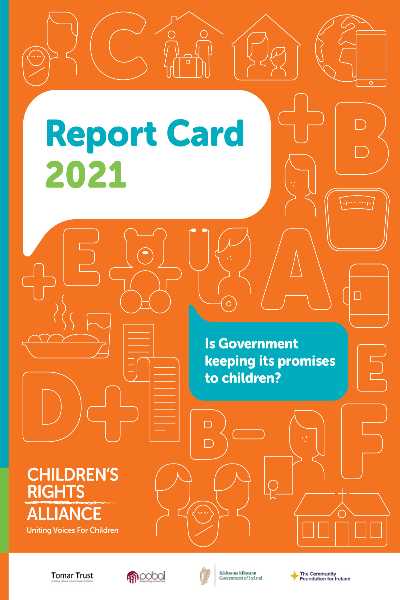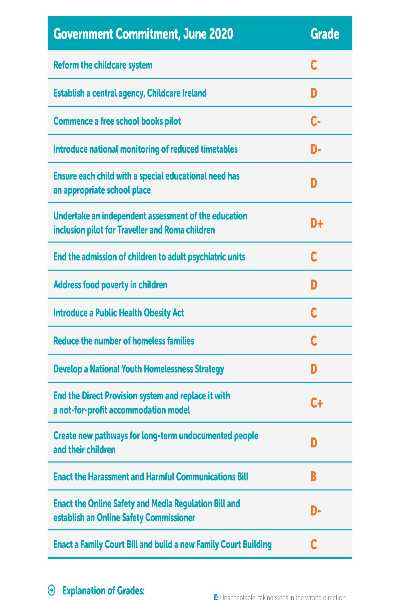Report Card 2021
This week saw the Children’s Rights Alliance publish their Report Card 2021. It is the first analysis of Fianna Fáil, Fine Gael and the Green Party’s joint Programme for Government: Our Shared Future and how it performed for children in 2020.
16 Key Promises
It examines 16 key promises to children and an independent panel of experts chaired by Judge Catherine McGuinness have graded the Government on its efforts since their formation from June to December 2020. This year’s report has to be viewed through the lens of the Covid-19 pandemic. The pandemic has created challenges which has frustrated Government action. This plays out in the grades with the new government securing a report card with 8 Ds, 7 Cs and just 1 B. The lowest grades were awarded to ‘Reduced Timetables’ and ‘Child Safety Online’, which both received ‘D-‘grades.

Traveller and Roma education and youth homelessness also received D grades.
The Government has acknowledged that Traveller and Roma children have been more severely impacted by school closures due to inequalities in access to broadband and technology and when regular schooling resumes, it is vital children can access their right to education in full. The report highlights the issue of reduced timetables being used without procedural safeguards as a major concern, giving the Government a D-. Reduced timetables were found to disproportionately affect children with special educational needs and disabilities; children of Traveller and Roma heritage; and children experiencing trauma or adversity. The report calls for a statutory framework and a monitoring system to be implemented immediately.
On the issue of Traveller and Roma education the Government received a D+. While it is positive that Traveller and Roma children and their families have been involved in an extensive research project to establish a baseline understanding of their experience of school, it is not yet published. Formal assessment of the pilot projects has not begun and there are no interim findings to share despite it being past the half-way mark. The report calls for an independent evaluation of the Traveller and Roma Education Inclusion Strategy Pilot Project, implemented as part of the National Traveller and Roma Inclusion Strategy. It highlights the fact that the Covid-19 pandemic has had a significant adverse impact on Traveller and Roma young people’s education throughout 2020 and has also affected delivery and evaluation of the pilot. It also points out that while guidance has been issued to schools on supporting pupils at risk of educational disadvantage, including Traveller and Roma children, without community-wide provision of digital devices and access to broadband, it is unclear how helpful this additional guidance will be.

The report highlights the fact that that Traveller families are disproportionately affected by the housing crisis. Traveller families make up less than 1% of the population yet they make up 7% of the homeless population and face high levels of discrimination when accessing housing. Travellers also experience high levels of hidden homelessness and accommodation overcrowding. There have been some encouraging signs with 2020 being the first year since 2014 that the €14.5 million funding provided for Traveller-specific accommodation was fully drawn down by local authorities however it is unclear whether this funding was used for new accommodation, refurbishment of existing units or Covid-19 related work on sites.
The full report is available here